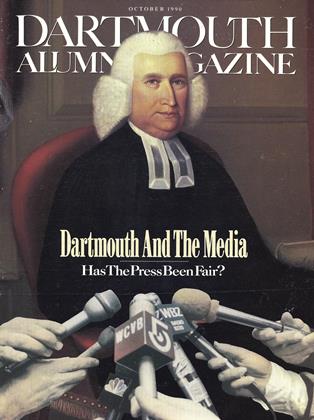Where Hunger Begins
Thank you for Professor Hoyt Alverson's "Politics of Hunger" ["Syllabus," Summer]. This piece is a thorough introduction to the debate on world hunger.
Hunger, like charity, begins at home. A serious study of the complex problems of hunger in America should be gin with Let Them Eat Promises: The Politics of Hunger in America by Pulitzer prizewinner Nick Kotz '55.
Rockville, Maryland
Haunted By Waters
A recent local newspaper obituary column noted the passing of former University of Chicago English Professor Norman Maclean of Dartmouth's class of 1924.
Dr. Maclean (whom I suspect would not use the title) embarked upon a second career as a novelist, after his retirement in 1973. He wrote about fishing and life, and his epitaph could come from the last lines of his short novel, A River Runs Through It.
Of course, now I am too old to be much of a fisherman, and now of course I usually fish the big waters alone, although some friends think I shouldn't. Like many fly fishermen in western Montana where the summer days are almost Arctic in length, I often do not start fishing until the cool of the evening. Then in the Arctic half-light of the canyon, all existence fades to a being with my soul and memories and the sounds of the Blackfoot River and a four-count rhythm and the hope that a fish will rise.
Eventually, all things merge into one, and a river runs through it. The river was cut by the world's great flood and runs over rocks from the basement of time. On some of the rocks are timeless raindrops. Under the rocks are the words, and some of the words are theirs.
I am haunted by waters.
What a legacy.
Minneapolis, Minnesota
The "four-count rhythm," in the passage refers to fly casting. We will publish an essay on Norman Maclean in a future issue.
Black & White & Read
I want to commend the marvelous black-and-white photographs in your Summer number. Jon Gilbert Fox has put us all in his debt with his sensitive and powerful portraits of "Voices Crying in the Wilderness" and also for his photos of "June in Hanover." They helped make this issue of DAM very special.
In the same vein, may I commend the other photographers who contributed importantly to the "June in Hanover" series? At the risk of singling one person out when the work of all is meritorious, rious, I would mention the shots of Stuart Bratesman '75 on pages 30 and 31.
Toward the back of this fine issue I also was favorably impressed by the grace of the Hanover houses depicted in the McLaughry Associates Realtors advertisement. Again, the photos benfited in my view from the black-and-white format.
Birmingham, Michigan
Mr. Pratt's comments were entirely unprompted. Honest.
Lesser Degrees
A lot of voices are crying about graduation speakers these days. Barbara Bush at Wellesley College comes to mind as well as "ex-Smithie president Jill Ker Conway," who you pointed out enjoyed something less than 100-percent approval at our graduation ["Dr. Wheelock's Journal," Summer].
Why bother with guest speakers, and why bother with conferring honorary degrees? If I were a Dartmouth Ph.D. faculty member, I would bristle at sitting up there and watching what I worked hard for given away for free. I'm surprised that the faculty hasn't had the guts to stand up and say, "No more!"
Cornell has done just that. No guest speakers, no honorary degrees. Does this lessen the excitement and drama of the event? No way! I was at Cornell for graduation '89 when my daughter received an advanced degree. Dartmouth never did it better—or even, some might say, as well.
Block Island, Rhode Island
Readers should not be entirely sated byProfessor Alverson's discussion of worldhunger proble?ns, says one correspondent.
 View Full Issue
View Full Issue
More From This Issue
-
 Cover Story
Cover StoryDARTMOUTH IN THE MEDIA
October 1990 By Peter S. Prichard '66 -
 Feature
FeatureTHE FORFEIT
October 1990 By Ken Johnson '83 -
 Feature
FeatureUNDERPROMISE AND OVERDELIVER
October 1990 By William H. Davidow '57 -
 Article
ArticleDR. WHEELOCK'S JOURNAL
October 1990 -
 Class Notes
Class Notes1980
October 1990 By Michael H. Carothers -
 Article
ArticleProf's Choice
October 1990
Letters to the Editor
-
 Letters to the Editor
Letters to the EditorCOMMUNICATIONS
February 1919 -
 Letters to the Editor
Letters to the EditorDesperate Situation
February 1939 -
 Letters to the Editor
Letters to the EditorLetters
May 1951 -
 Letters to the Editor
Letters to the EditorLetters to the Editor
December 1976 -
 Letters to the Editor
Letters to the EditorLetters
OCTOBER 1982 -
 Letters to the Editor
Letters to the EditorWorry Them, Terriers!
OCTOBER 1996

